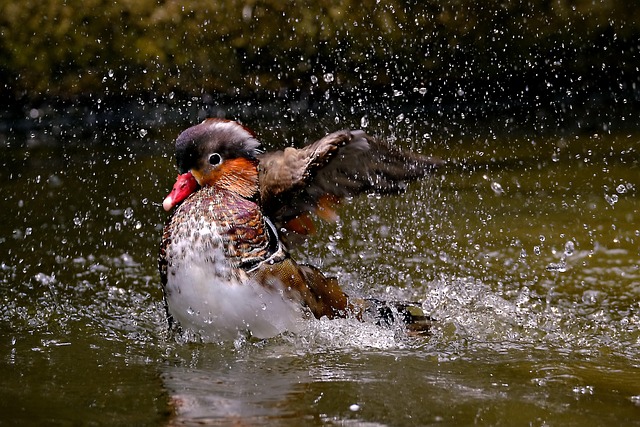College golf teams, such as the Ducks Men's Golf team, require specialized training programs addressing both athletic performance and academic demands. These programs focus on physical development (strength, flexibility, injury prevention), mental resilience, and holistic success through structured year-round training, periodization, strength conditioning, swing technique refinement, mental preparation, and proper nutrition/recovery strategies. By collaborating with athletes, coaches optimize performance and minimize injury risk, fostering competitive edge in college golf.
“Unleashing the potential of Ducks men’s golf athletes requires a holistic training regimen tailored to their unique needs. This comprehensive guide explores strategies vital for success in college golf. From establishing a year-round framework to refining swing techniques and mental preparation, each aspect contributes to peak performance. We delve into evidence-based strength and conditioning, course management tactics, and sports psychology techniques to enhance focus and resilience. Additionally, the role of proper nutrition, recovery methods, and injury prevention strategies are highlighted, ensuring the longevity and excellence of college golf teams.”
- Understanding the Unique Needs of Ducks Men's Golf Athletes
- Establishing a Year-Round Training Framework
- Strength and Conditioning for Optimal Performance
- Refining Swing Technique and Course Management
- Mental Preparation and Sports Psychology Strategies
- Nutrition, Recovery, and Injury Prevention for College Golf Teams
Understanding the Unique Needs of Ducks Men's Golf Athletes

College golf teams, like the Ducks Men’s Golf team, require tailored training regimens that cater to their unique physical and mental demands. Unlike professional golfers, college athletes juggle rigorous academic schedules alongside intense athletic training, making balanced development crucial. Their bodies are still growing and developing, requiring specific exercises for strength, flexibility, and injury prevention. Mentally, they face the pressure of competition while navigating the complexities of higher education, necessitating stress management techniques and mental resilience training to enhance performance on and off the course.
Understanding these multifaceted needs is essential for designing effective training programs. Coaches and support staff must work collaboratively with athletes to address individual strengths and weaknesses, incorporating a mix of traditional golf exercises, cross-training activities, and sports science innovations. By recognizing and addressing these unique challenges, the Ducks Men’s Golf team can optimize performance, reduce injury risk, and prepare athletes for both academic and athletic success.
Establishing a Year-Round Training Framework

Establishing a structured year-round training framework is essential for the continuous development of Ducks men’s golf athletes, aiming to keep them at peak performance levels. This involves more than just preparing for specific tournaments; it’s about fostering a holistic approach that addresses physical conditioning, mental preparation, and technical skill refinement throughout the entire year. For college golf teams, this means creating a consistent schedule that integrates off-season strength and conditioning, on-course practice sessions during the spring and fall, and competitive events that provide opportunities for athletes to apply their skills in high-pressure situations.
A well-rounded training regimen should also incorporate periodization, where specific phases are dedicated to different aspects of performance. For instance, the off-season can focus on building a solid foundation through strength and conditioning programs tailored to improve athleticism and reduce injury risk. The pre-season then shifts towards refining technical skills and tactical understanding on the course, while the in-season emphasizes competitive play and mental toughness training to help athletes handle the rigors of tournament golf.
Strength and Conditioning for Optimal Performance

The strength and conditioning program plays a pivotal role in enhancing the performance of Ducks men’s golf athletes, who strive to excel in one of the most demanding sports. For college golf teams, where every milligram of power and precision counts, structured training is essential. The regimen focuses on building core strength, flexibility, and explosive muscle groups to improve swing speed and consistency. Athletes engage in regular sessions that incorporate a mix of traditional weight training exercises and functional movements mimicking golfing actions.
This holistic approach ensures athletes develop balanced physical attributes crucial for enduring the rigors of competitive golf. By prioritizing proper technique, power development, and injury prevention through strength and conditioning, Ducks men’s golf teams aim to stay ahead in a highly competitive landscape, maximizing their potential on the course.
Refining Swing Technique and Course Management

For Ducks men’s golf athletes, refining swing technique and course management is a critical component of their training regimen. This involves meticulous practice sessions focused on improving clubface alignment, swing path, and impact consistency. By breaking down each swing into its fundamental parts—grip, posture, backswing, downswing, and follow-through—coaches can help players master the technical aspects that translate directly to lower scores.
On the course, managing strategies become as important as mastering the swing. College golf teams often employ data-driven approaches, using tracking devices and analytics to evaluate performance on different hole types and terrain. Players learn to adapt their approach based on weather conditions, green speed, and lie of the ball. This course management includes strategic club selection, planning for hazards, and understanding when to take risks versus playing conservatively to avoid mistakes.
Mental Preparation and Sports Psychology Strategies

Mental preparation is a key component in the training regimen for Ducks men’s golf athletes, aiming to equip them with the right mindset for peak performance on and off the course. College golf teams often face intense competition, requiring athletes to stay focused and maintain a positive mental attitude. Sports psychology strategies such as visualization, goal setting, and mindfulness practices help players envision success, set realistic objectives, and remain present during their rounds, despite external pressures.
Coaching staff plays a vital role in guiding athletes through these techniques, fostering an environment that encourages open communication about emotional challenges. By integrating mental preparation into their training, Ducks golfers can enhance their overall confidence, develop resilience against pre-tournament jitters, and ultimately, perform at their best during crucial matches, setting them apart from other college golf teams.
Nutrition, Recovery, and Injury Prevention for College Golf Teams

Proper nutrition is integral to the performance and well-being of college golf teams. Athletes require a balanced diet rich in proteins, carbohydrates, and healthy fats to fuel their intense training sessions. A nutritious meal plan should be tailored to meet the specific energy needs of golfers, ensuring they maintain optimal stamina throughout practice and competitions. Additionally, incorporating adequate hydration strategies is essential to prevent dehydration, which can significantly impact performance.
Recovery plays a pivotal role in the overall success of college golf teams. After rigorous practices and tournaments, athletes must prioritize rest and recovery techniques. This includes proper sleep hygiene, active recovery sessions, and effective stretching routines to alleviate muscle soreness. Incorporating recovery modalities such as foam rolling, ice baths, or compression gear can further enhance the team’s ability to bounce back from demanding workouts, reducing the risk of overuse injuries.






